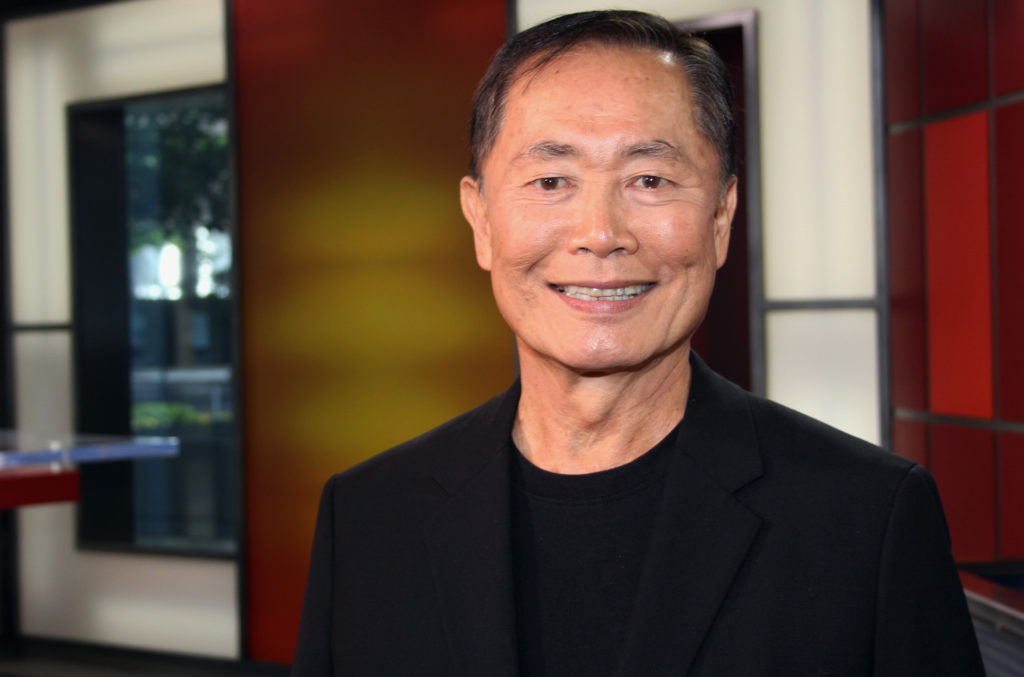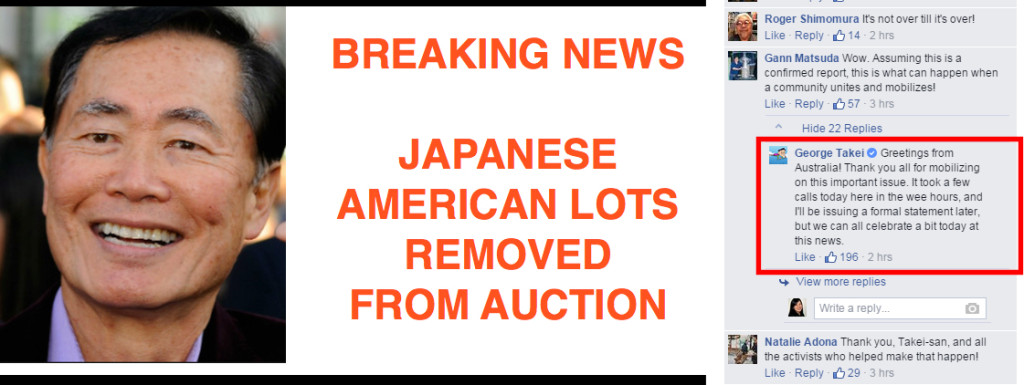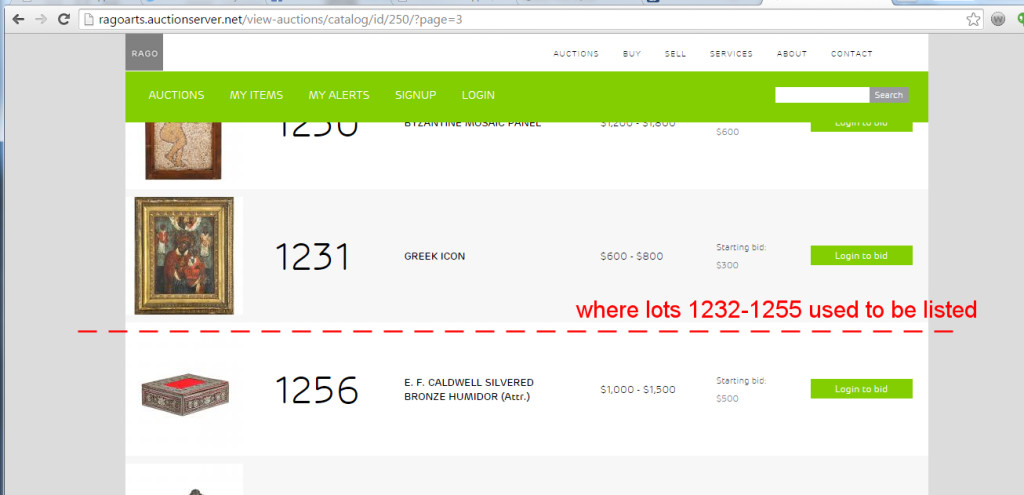
Twenty minutes ago, the Japanese American organizers behind the #StopRago campaign (which I wrote about earlier today), announced via their Facebook page that Rago auction house had decided to remove the lots containing approximately 450 artifacts from Japanese American incarceration. This move came after nearly a week of heated backlash from the Japanese American community who object to Friday’s scheduled auction of familial heirlooms and artifacts donated under the promise of creating an exhibit on Japanese American experiences in World War II concentration camps. Friday’s planned sale amounted to profiteering on the pain of Japanese American camp survivors.
Organizers urged the community to sign this Change.org petition and to tweet to #StopRago.
The #StopRago group announced that these efforts were victorious. Moments ago, a Rago company spokesman said at the auction house’s offices in Lambertville, New Jersey that the artifacts will no longer be sold this Friday. Instead, actor and outspoken advocate for the preservation of Japanese American history George Takei will serve as an intermediary between the Rago auction house and various Japanese American museums, advocacy groups and families interested in the items.
The Facebook post reads in full:
JAPANESE AMERICAN OBJECTS IN LOTS 1232-1255, made in WW2 concentration camps, will be removed from the Rago auction on Friday, a company spokesman said in Lambertville, NJ, tonight. George Takei has agreed to act as an intermediary between the Rago auction house and Japanese American community institutions, reported Toshi and Nancy Abe, who were present at the event.
Folks on Twitter report that the change of heart comes after Takei stepped in and applied his ample influence.
Just in: Change of heart in the sale of Japanese-American artifacts from WWII Internment Camps. #Breaking #JACL
— Denise Nakano (@NakanoDenise) April 15, 2015
@DeniseNakanoTV Owner of Rago Auctions in Lambertville tell me decision to stop auction came after talks with George Takei's people.
— Denise Nakano (@NakanoDenise) April 15, 2015
However, organizers continued to caution reserve, saying that the #StopRago fight is not over.
(FWIW, I do not believe that this is over, but the stopping of the "ticking clock" is HUGE.) Continue the pressure to #StopRago.
— Tamiko Nimura (@TamikoN) April 15, 2015
Organizers are asking that supporters continue to sign the Change.org petition until this issue is fully resolved.
I will update this post with additional details as they emerge.
This, by the way, is the power of grassroots activism. And also, apparently, the sheer awesome that is George Takei.
Update (4/15/2015):
The Twitter account of Allegiance, the upcoming Broadway musical starring George Takei and inspired by his experiences as a child growing up in a WWII concentration camp, confirmed that Takei spoke with Rago auction house earlier today.
Confirming that following convos w/ @GeorgeTakei & Team, @RagoAuctions? has halted the Japanese American Internment art auction. #StopRago
— Allegiance (@allegiancebway) April 16, 2015
This is an American story to be preserved for posterity. #StopRago
— Allegiance (@allegiancebway) April 16, 2015
We are grateful that Japanese American history was not made for sale to the highest private bidder. #StopRago
— Allegiance (@allegiancebway) April 16, 2015
And, George Takei himself confirmed on the Japanese American History: NOT For Sale Facebook page that he placed a series of phonecalls to Rago auction house today to stop Friday’s scheduled auction.

For those who can’t read it, Mr. Takei’s comment says:
Greetings from Australia! Thank you all for mobilizing on this important issue. It took a few calls today here in the wee hours, and I’ll be issuing a formal statement later, but we can all celebrate a bit today at this news.
And then, I tweeted:
Anyone else wish they had a tape of when @RagoAuctions picked up the phone & heard: "Hi, this is @GeorgeTakei. You need to stop."? #StopRago
— Jenn | Reappropriate (@reappropriate) April 16, 2015
Update (4/16/2015): Major additional details are now available! Last night, Rago Auction House issued a statement to the press confirming their decision to pull the Japanese American incarceration artifacts from Friday’s planned “Great Estates” sale. As reported by the Sacramento Bee, that statement read in part:
“There is an essential discussion to be had about the sale of historical items that are a legacy of man’s inhumanity to man,” said Miriam Tucker, managing partner of Rago Arts and Auction Center, in a statement released Wednesday evening. “It extends beyond what is legal. It is something auction houses, galleries and dealers are faced with regularly. We hope this controversy will be the beginning of a discourse on this issue.”
However, in a separate article by CNN, Rago auction house owner David Rago made the following (passive aggressive) statement by email to a reporter, which raises questions about the sincerity of Rago auction house’s commitment to preserving artifacts of the legacy of “man’s inhumanity to man”:
“Once the dust settles from this auction weekend (1,200 lots in three days) we will work with a small group of people from the Japanese-American community who have identified themselves through this process as generous, informed, voices of reason,” he wrote.
This statement echoes earlier statements by the collection’s anonymous consigner that characterized the backlash from the Japanese American community as “bullying“, and appears to chastise the Japanese American community for failing to express a more “comfortable” degree of anger.
As of this morning, lots 1232-1255 which contained the entire Eaton collection of Japanese American incarceration artifacts are no longer listed on the Rago website for Friday’s scheduled sale.

Although intervention from actor George Takei was clearly a major impetus for Rago’s change of heart, it appears that Takei’s influence was only half of the full story. Simultaneous with Takei’s reported phone calls to Rago auction house, Heart Mountain Wyoming Foundation (HMWF) spent the day preparing a lawsuit (.pdf) against Rago Auction House and the Eaton collection’s anonymous consigner. They notified their intent to file the suit to Hunterdon County Superior Court in contesting that the Eaton collection was both “wrongly held” because the transfer of the items to the anonymous consigner violated the conditions under which the items were first given to Eaton, and that both the anonymous consigner and Rago would derive “unjust enrichment” from their sale.
The HMWF’s intended lawsuit also provides new details of the cash offer the foundation made earlier this week for the entire Eaton collection. It describes that Rago originally estimated the value of the entire collection at $26,500, and that HMWF was able to collect pledges from nine donors to offer a cash total of $50,000 — nearly double the items’ estimated value. HMWF says in the suit that the Japanese American community attempted a series of negotiations prior to the cash offer, asking for a delay in Friday’s sale so that the community might at least research the items and contact family members and other historical institutions. After rushing collection of pledges, they made the cash offer with the plan to at least secure the items for “posterity and educational purposes”. They describe that their subsequent intent for the collection as follows:
Plaintiff (HMWF) intends to locate the heirs to the artifacts to return the items to their rightful owners. Plaintiff also intends to preserve the remaining items for display at its museum, and to share them with other Japanese American institutions.
Rago rejected that offer with the baffling explanation that the consigner felt they were “not qualified to determine which organization is best suited for this collection.”
Hours after Rago received notification of HMWF’s intent to file this lawsuit (and apparently simultaneous with their fielding of phone calls from George Takei’s people), Rago announced their intent to withdraw the collection from Friday’s sale. HMWF issued a press statement saying:
“The Foundation and the many people who have supported us in the last few weeks are thrilled that the immediate risk to the collection has been averted, and we are appreciative of the wider Japanese American community’s concerns,” said HMWF Chair Shirley Ann Higuchi. “We now turn to the challenge of securing the future care of the collection and protecting it in collaboration with all concerned Japanese American-related institutions.”
